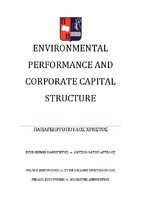Environmental performance and corporate captial structure

Προβολή/
Λέξεις κλειδιά
Corporate captial ; Corporate Social Responsibility (CSR) ; Socially Responsible Investment (SRI)Περίληψη
In the modern globalized economies the corporations, as an institution, has proved to be the most influential societal driver. In this environment there are many who urge for a reexamination of the corporations’ role as corporate citizens. While the neoclassical shareholder theory regards a firm’s sole interest the maximization of the shareholder’s value, new theories have been proposed under the principle of Corporate Social Responsibility (CSR). These theories have incorporated into their design all involved stakeholders and the externalities on the natural environment. On this basis, the Socially Responsible Investment (SRI) strategy have been developed arguing that firms with superior environmental performance, provide superior return at a lower risk. The paper at hand will try to provide some insight by examining whether financial markets reward environmental performance and its disclosure by improving access to debt financing. Adapting the asymmetric information theory and its effect on corporate capital structure as the pecking order theory suggests, we examine the correlation between leverage, and the disclosure of environmental activities and performance. If the proposed hypothesis holds true, increased leverage should be expected as an indicator that cost of capital and default risk are lower for environmentally concerned companies.


